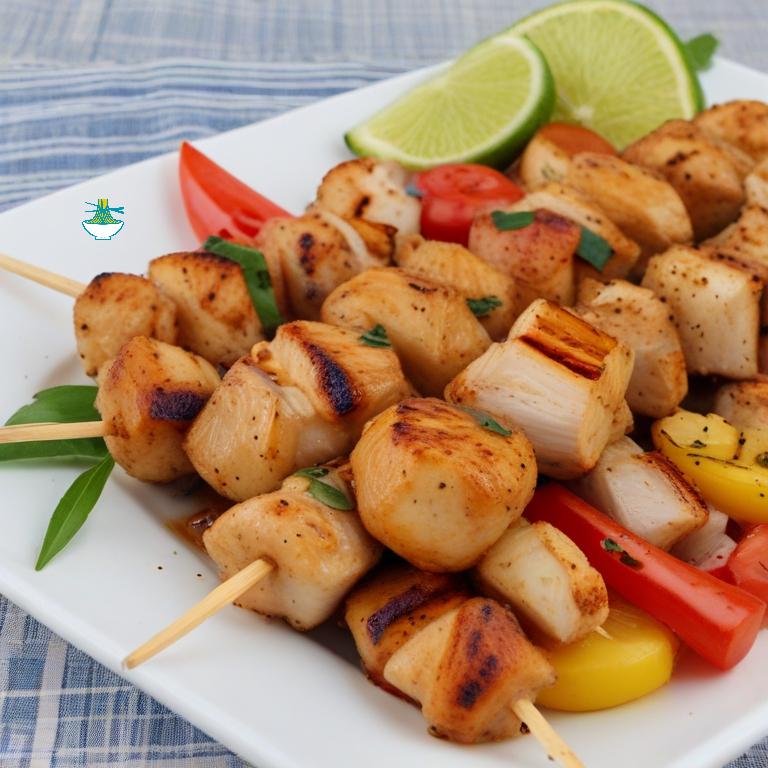Grilled chicken skewers are a popular dish enjoyed worldwide, originating from various cultures that have embraced skewered and grilled meats for centuries. The recipe involves marinating chicken pieces in a flavorful blend of spices and then skewering them before grilling, resulting in tender, juicy, and aromatic chicken bites perfect for any occasion.
Ingredients:
- Chicken breast or thigh, cut into bite-sized pieces
- Olive oil
- Lemon juice
- Garlic, minced
- Paprika
- Salt and pepper
- Optional: Onion, bell peppers, cherry tomatoes for skewering

Preparation Method:
1. In a bowl, mix olive oil, lemon juice, minced garlic, paprika, salt, and pepper to create the marinade.
2. Add the chicken pieces to the marinade, ensuring they are well coated. Let it marinate for at least 30 minutes to enhance flavors.
3. Preheat the grill to medium-high heat.
4. Thread the marinated chicken pieces onto skewers, alternating with optional vegetables if desired.
5. Grill the skewers for about 8-10 minutes, turning occasionally, until the chicken is cooked through and has a nice charred exterior.
6. Serve hot, garnished with fresh herbs or a squeeze of lemon juice if desired.
Nutrition Value:
1. Chicken Breast or Thigh, Cut into Bite-sized Pieces:
- Calories: Approximately 120-150 calories per 100 grams, depending on the cut and cooking method.
- Carbohydrates: Negligible (less than 1 gram per serving).
- Protein: High in protein, providing about 25 grams per 100 grams.
- Fat: Low in fat, with around 3-5 grams per 100 grams.
- Sodium: Varies based on seasoning and marinade, typically around 50-75 milligrams per serving.
- Cholesterol: Moderately low, about 70-80 milligrams per 100 grams.
- Vitamins: Rich in B vitamins, particularly niacin (vitamin B3) and vitamin B6.
- Minerals: Contains essential minerals like iron, phosphorus, and zinc.
- Nutritional Benefits: Chicken is a lean source of protein that supports muscle growth and repair. It also provides important vitamins and minerals for overall health and immune function.
2. Olive Oil:
- Calories: About 120 calories per tablespoon (15 ml).
- Carbohydrates: Negligible.
- Fat: High in healthy monounsaturated fats, providing about 14 grams per tablespoon.
- Vitamins: Contains vitamin E, a powerful antioxidant.
- Minerals: Contains small amounts of iron and calcium.
- Nutritional Benefits: Olive oil is heart-healthy, helps lower bad cholesterol levels, and provides antioxidants that protect cells from damage.
3. Lemon Juice:
- Calories: Very low, about 4-5 calories per tablespoon (15 ml).
- Carbohydrates: Low, with around 1-2 grams of carbs per serving.
- Vitamins: Excellent source of vitamin C.
- Minerals: Contains small amounts of potassium and folate.
- Nutritional Benefits: Lemon juice adds tangy flavor and provides vitamin C, which boosts immunity and aids in collagen synthesis.
4. Garlic, Minced:
- Calories: Approximately 5-10 calories per clove.
- Carbohydrates: Low, with about 1 gram of carbs per clove.
- Protein: Contains a small amount of protein.
- Vitamins: Rich in vitamin C and vitamin B6.
- Minerals: Contains manganese, selenium, and calcium.
- Nutritional Benefits: Garlic is known for its immune-boosting properties, heart health benefits, and anti-inflammatory effects.
5. Paprika:
- Calories: Around 20 calories per tablespoon (8 grams).
- Carbohydrates: Low, with about 4-5 grams of carbs per serving.
- Vitamins: Good source of vitamin A, vitamin E, and vitamin B6.
- Minerals: Contains iron, magnesium, and potassium.
- Nutritional Benefits: Paprika adds color and flavor while providing antioxidants, vitamins, and minerals that support overall health.
6. Salt and Pepper:
- Salt: Use in moderation, as excessive salt intake can contribute to high blood pressure.
- Pepper: Low in calories and carbohydrates, adds flavor without significant nutritional impact.
- Nutritional Benefits: Salt enhances flavor, while pepper adds a spicy kick and may have anti-inflammatory properties.
7. Optional: Onion, Bell Peppers, Cherry Tomatoes for Skewering:
- Calories: Varies based on the amount used.
- Carbohydrates: Provides fiber and natural sugars.
- Vitamins: Rich in vitamin C, vitamin A, and various B vitamins.
- Minerals: Contains potassium, magnesium, and folate.
- Nutritional Benefits: These vegetables add color, flavor, and texture to the skewers, along with vitamins, minerals, and antioxidants that promote overall health.


Comments